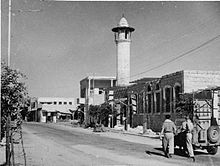“On November 30, seven Jews were killed in an attack near Ramleh when traveling from Tel-Aviv to Jerusalem. During the following few days most non-Arabs vehicles passing along this road were subject to attacks near Ramleh by snipping and ambush. On December 3, a senior Government Official informed the Jewish Agency that police escort could not be provided for inter-urban convoys since ‘that might be interpreted as British implementation of partition.’ The suggestion and no attention was paid to the precedents for the imposition of several days’ curfew on urban areas such as Tel-Aviv, ten times the size of Ramleh, in reaction to violence committed by dissident groups and condensed by the whole community.
In pursuance of this policy the Government continued for several days not only to withhold protection from travelers on the roads but to penalize those who took measures in their own defense. On December 4, a car taking Air France passengers from Tel-Aviv to Lydda was attacked near the Arab village of Yehudia. Vehicles carrying Norwegian Air Line and United States Trans-World airline passengers were also fired upon. On December 13, a British Overseas Airways Corporation car was attacked near Lydda airport; four of the corporation’s employees were brutally murdered by Arabs. On December 25, the Government refused a request from the BOAC and TWA air companies for use of the Royal Air Force airfield at Atteroth near Jerusalem as a station for a shuttle service to avoid transporting air passengers by car through an area infested with Arab snipers.
On December 7, a Jewish convoy was out from Tel-Aviv to Jerusalem. One of the passengers was Joshua, Globerman, a leading member of the Haganah. On the road the convoy was halted by a British patrol and search from arms. When the convoy proceeded on its way, Globerman was shot through the head by two Arabs who attacked his car with rifle fire. He was unarmed because of his urgent desire to reach Jerusalem on an important mission without risk of arrest.”
Source: United Nations Palestine Commission, February 24, 1948
